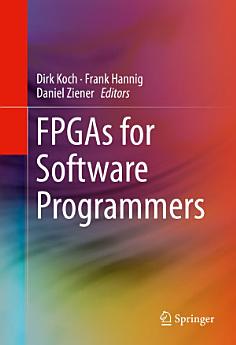FPGAs for Software Programmers
Dirk Koch · Frank Hannig · Daniel Ziener
2016년 6월 · Springer
3.0star
리뷰 2개report
eBook
327
페이지
report검증되지 않은 평점과 리뷰입니다. 자세히 알아보기
eBook 정보
This book makes powerful Field Programmable Gate Array (FPGA) and reconfigurable technology accessible to software engineers by covering different state-of-the-art high-level synthesis approaches (e.g., OpenCL and several C-to-gates compilers). It introduces FPGA technology, its programming model, and how various applications can be implemented on FPGAs without going through low-level hardware design phases. Readers will get a realistic sense for problems that are suited for FPGAs and how to implement them from a software designer’s point of view. The authors demonstrate that FPGAs and their programming model reflect the needs of stream processing problems much better than traditional CPU or GPU architectures, making them well-suited for a wide variety of systems, from embedded systems performing sensor processing to large setups for Big Data number crunching. This book serves as an invaluable tool for software designers and FPGA design engineers who are interested in high design productivity through behavioural synthesis, domain-specific compilation, and FPGA overlays.
- Introduces FPGA technology to software developers by giving an overview of FPGA programming models and design tools, as well as various application examples;
- Provides a holistic analysis of the topic and enables developers to tackle the architectural needs for Big Data processing with FPGAs;
- Explains the reasons for the energy efficiency and performance benefits of FPGA processing;
- Provides a user-oriented approach and a sense for where and how to apply FPGA technology.
평점 및 리뷰
3.0
리뷰 2개
저자 정보
Dirk Koch is a lecturer in the Advanced Processor Technologies Group at the University of Manchester. His main research interest is on run-time reconfigurable systems based on FPGAs, including methods, tools and applications. Current research projects include database acceleration using FPGAs based on stream processing as well as reconfigurable instruction set extensions for CPUs. Dirk was a program co-chair of the FPL2012 conference and he is a program committee member of many FPGA related conferences and workshops. He is author of the book "Partial Reconfiguration on FPGAs," he holds two patents, and he has (co-)authored over 50 conference and journal publications. Frank Hannig leads the Architecture and Compiler Design Group in the CS Department at the Friedrich-Alexander University Erlangen-Nürnberg (FAU), Germany, since 2004. He received a diploma degree in an interdisciplinary course of study in EE and CS from the University of Paderborn, Germany in 2000 and a Ph.D. degree (Dr.-Ing.) in CS from FAU in 2009. His main research interests are the design of massively parallel architectures, ranging from dedicated hardware to multi-core architectures, mapping methodologies for domain-specific computing, and architecture/compiler co-design. Frank has authored or co-authored more than 120 peer-reviewed publications. He serves on the program committees of several international conferences (ARC, ASAP, CODES+ISSS, DATE, DASIP, SAC). Frank is a senior member of the IEEE and an affiliate member of the European Network of Excellence on High Performance and Embedded Architecture and Compilation (HiPEAC).divDaniel Ziener is currently a substitute professor for Cyber-Physical Systems at the Technische Universität Hamburg-Harburg, Germany. From 2010 to 2015, he had led the Reconfigurable Computing Group in the Computer Science Department at Friedrich-Alexander University Erlangen-Nürnberg (FAU), Germany. His main research interests are the usage of partial dynamic reconfiguration of FPGAs, efficient usage of FPGA structures, design of signal processing FPGA cores, reliable and fault tolerant embedded systems, as well as security in FPGA-based systems. Daniel has (co-)authored more than 35 peer-reviewed publications, holds two patents, and serves as a program committee member of several international conferences (DATE, FPL, Reconfig, SPL) as well as a reviewer for several international journals.
이 eBook 평가
의견을 알려주세요.
읽기 정보
스마트폰 및 태블릿
노트북 및 컴퓨터
컴퓨터의 웹브라우저를 사용하여 Google Play에서 구매한 오디오북을 들을 수 있습니다.
eReader 및 기타 기기
Kobo eReader 등의 eBook 리더기에서 읽으려면 파일을 다운로드하여 기기로 전송해야 합니다. 지원되는 eBook 리더기로 파일을 전송하려면 고객센터에서 자세한 안내를 따르세요.





